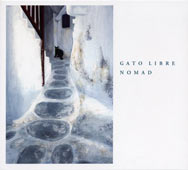
Gato Libre
Nomad
(No Man’s Land)
If
I consider only those artists that up to that point I have never heard
of, then it’s quite easy to place those unsolicited CDs that I find in
my mailbox in two broad categories: rubbish, and things of (a certain)
quality, with the former category having the greater number of items by
far. Deciding under which category to put any item is something that most
of the time doesn’t really require a lot of effort, and sometimes listening
to the whole oeuvre is not even necessary. But, once in a while, here comes
an album that is not too easily categorized, thanks to its ambiguities
and chiaroscuri.
As
it’s the case with this CD by a Japanese quartet called Gato Libre. From
the (very tiny) picture appearing inside the CD case I imagined the four
members of the group (Natsuki Tamura, trumpet; Kazuhiko Tsumura, acoustic
guitar; Satoko Fujii, accordion; Norikatsu Koreyasu, double bass) to be
quite young, but their résumé told me a very different story: they are
all musicians in their late forties who possess a long CV; the accordion
player is a highly esteemed pianist with many CDs under her name, while
the trumpet player is the leader, and the composer of all the tracks that
are featured here.
So
they can play. But what about the music? Here comes the fun. As per its
title (Nomad), the CD presents a series of compositions (that were inspired
by? that are supposed to remind us of?) with titles such as In Krakow,
In November or In Venice, In October. It would be easy being ironic, and
saying that finding a
"Krakowian air" in the track dedicated to Krakow while having never
been there – or having listened to any music from that town – brings us to
the
"movie soundtrack" factor, to the (definitely modern) possibility
we have to be able (to believe) to remember things that we have never really
known.
The
CD possesses a certain delicate charm, even if it’s really too long. The
trumpet has a round sound, never spiky; the guitar is clear, and clearly
recorded; the accordion is quite convincing; the double bass has a nice
sound, and plays some "daring" harmony parts. The first track
can work as an illustration of the whole: a melancholic theme played by
the trumpet (let’s not forget we are in Krakow in November), then the accordion,
then a trumpet solo with a nice backing by double bass and guitar, then
an accordion solo (a bit on the tearjerker side), then a "bluesy" guitar;
closing theme, end.
In
my opinion those melancholic themes are what this group does best: In Paris,
In February; In Berlin, In September; In Venice, In October. Very beautiful
double bass solos, with and without arco. On the average, I found the more
vivacious themes – In Glasgow, In May and In Barcelona, In June – to be
less convincing, though we have a nice In Madrid, In August, with its "heroic" trumpet.
I
thought a lot about Nomad. (Four Japanese musicians playing European folklore…
maybe here we have a bizarre mirror image of the Penguin Cafe Orchestra?)
Sure, it’s not too difficult here to see a certain naiveté; but I don’t
think it’s quite right that some projects that are no less banal, even
though this is a bit difficult to see for the naked eye, are much-lauded
(first examples that come to the mind? The "trumpet & beats" by
Nils Potter Molvaer on Solid Ether and the "funky/B movie" aesthetic
of Uri Caine’s Bedrock).
I
really can’t say who the potential audience for this album could be today.
In times long-gone I would have thought of those who, while still in love
with everyday tonality, didn’t fear the lack of drums or the double bass
solos.
"Intelligent easy listening", if you like. But what’s "easy
listening" today? (I have this question in my mind since the day a friend
of mine gave me a lift and I gently suggested to him that the day had come
for him to buy a new car. I was greatly embarrassed to know that, while deep
in traffic, those squeaks I was listening to came from the new CD by…)
Beppe
Colli
©
Beppe Colli 2006
CloudsandClocks.net | Nov.
17, 2006


